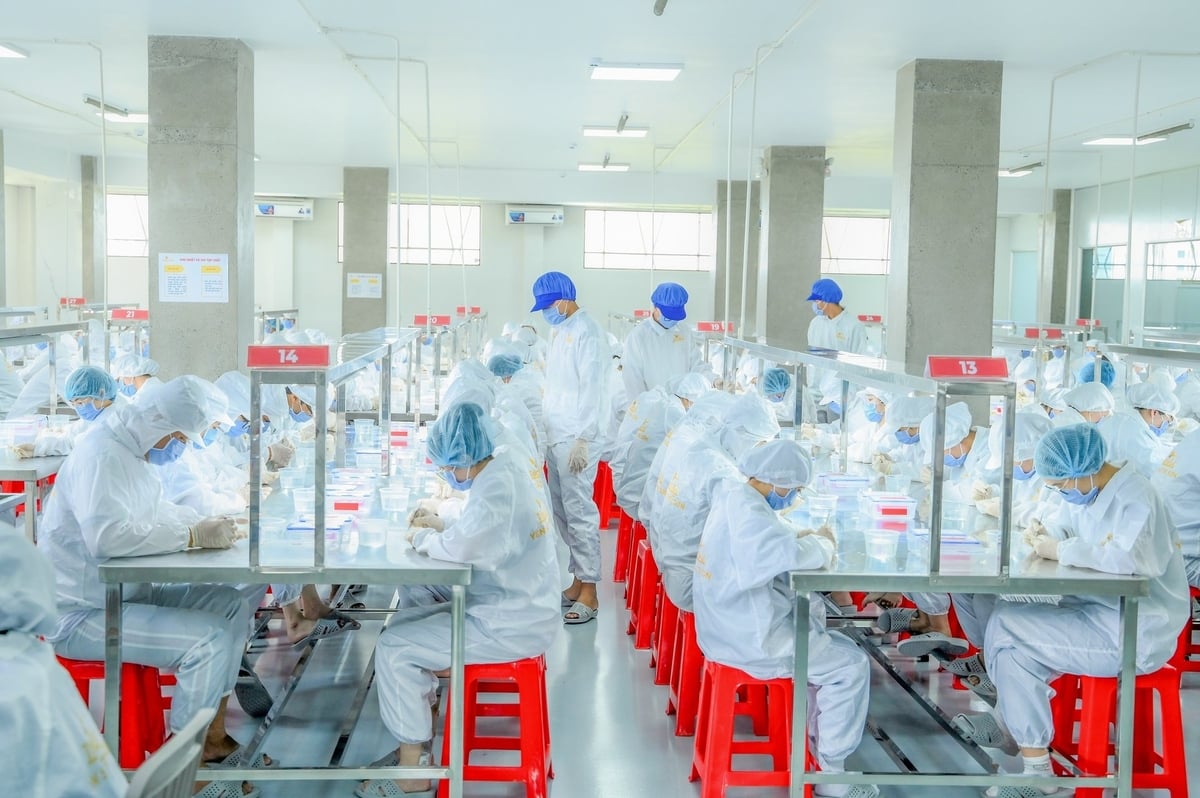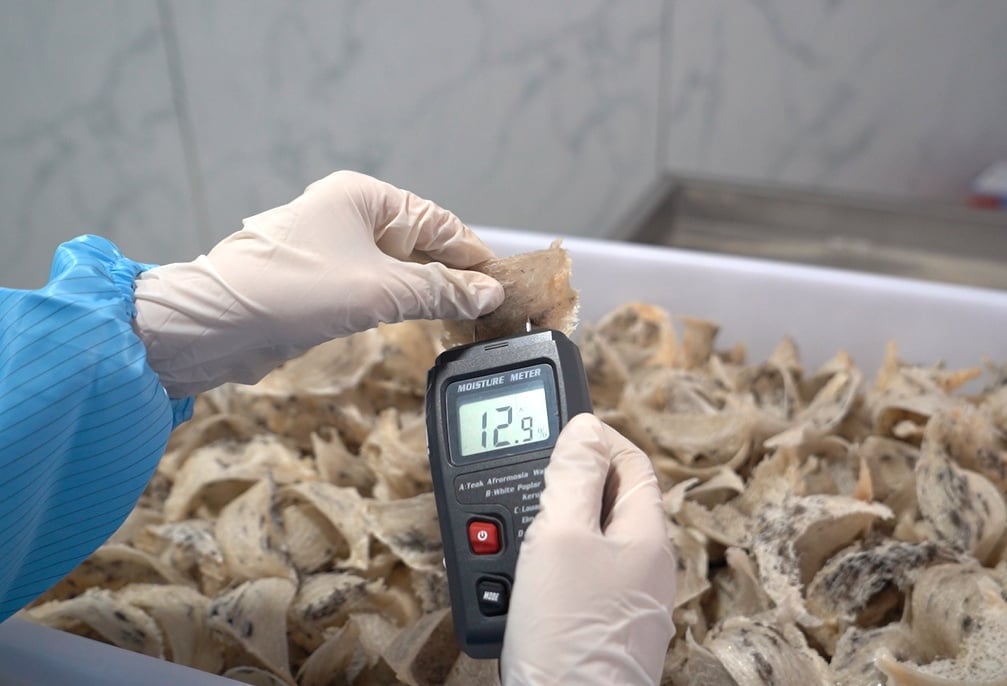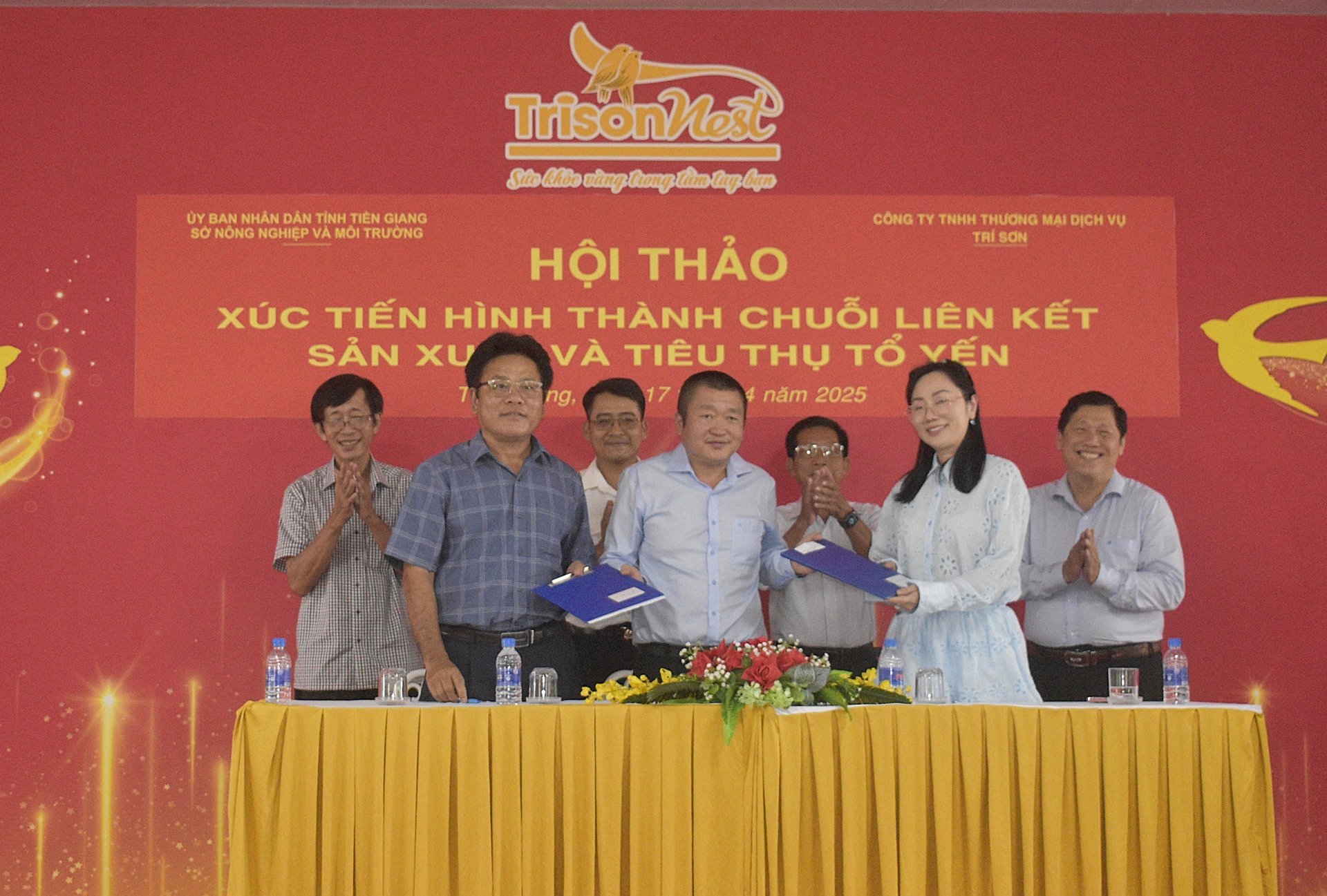December 7, 2025 | 19:49 GMT +7
December 7, 2025 | 19:49 GMT +7
Hotline: 0913.378.918
December 7, 2025 | 19:49 GMT +7
Hotline: 0913.378.918

Preliminary processing of bird's nest at Tri Son Company.
Tien Giang is home to 1,782 swiftlet farming households, which is the second highest number in the country, with an average annual output of 20 tonnes. In order to ensure a sustainable and stable export market, the local bird's nest industry must establish a strong supply chain in light of this substantial production.
Bird's nest products exported to China must adhere to rigorous food safety and hygiene standards, as stipulated in the Protocol signed by the Vietnamese Ministry of Agriculture and Environment and the General Administration of Customs of China (GACC). In particular, the products must be subjected to veterinary quarantine, the nest droppings must be free of pathogens, full traceability is required, and the nests must be preliminarily processed at facilities that have been granted an official packaging code for export to China.
In order to facilitate the growth of this integrated supply chain that links swiftlet producers, preliminary processors, and processing facilities, the Tien Giang Provincial Department of Agriculture and Environment performed a seminar that gathered all stakeholders to execute a cooperation agreement. The purpose of this effort is to create a standardized raw material zone that is designed to increase the value of the product and is geared toward exports.

Checking bird's nest before preliminary processing.
Deputy Director of the Sub-Department of Livestock Production and Animal Health of Tien Giang Province, Thai Quoc Hieu, stated, "We introduced central and local policies and provided guidance on swiftlet farming practices that meet veterinary hygiene standards. We also outlined the technical requirements and criteria necessary for bird's nest products to qualify for export to China. These efforts aim to establish a food-safe, disease-free production and consumption linkage for bird’s nest exports.”
Tri Son Trading and Service Co., Ltd. (Tri Son Co., Ltd.) processes bird’s nest products using a hybrid method that combines traditional craftsmanship with a modern production line. This process is rigorously monitored in accordance with the HACCP standard to ensure adherence to food safety management systems, including ISO 22000:2018 and GMP. The company provides over 100 product categories, with 30 of them having been granted the OCOP (One Commune One Product) certification.
Tri Son is currently engaged in the official export of bird's nest to China under the bilateral Protocol, with an export quota of 70 tonnes per year—the highest in Vietnam. The company has established a network of 253 swiftlet farming facilities by establishing connections with local swiftlet houses in order to develop a sustainable raw material area for export. This supply chain is being constantly expanded by the company, which is an optimistic development for the province's flagship product.
The firm commenced the official export of bird's nest to China at the conclusion of 2024, as per Bui Bang Son, Director of Tri Son Company. Currently, it has effectively shipped three consignments, with a total value of approximately VND 10 billion, at an average rate of 300–500 kilograms per month.
"The initial export results indicate that Vietnamese bird's nest products are currently in competition with those from countries such as Indonesia and Malaysia. Our production capacity is steadily increasing. The current workforce includes around 200 employees, and we plan to expand further to meet the growing demand for exports,” Son stated.
Trinh Cong Minh, Deputy Director of the Department of Agriculture and Environment, disclosed that the province is prioritizing two critical areas in its development strategies for the bird's nest industry.

Tri Son Company and businesses and bird's nest farms signed an agreement to form a chain linking production and consumption of bird's nest in Tien Giang province.
The Ministry of Agriculture and Environment of Vietnam and China's General Administration of Customs signed a new Protocol on the quarantine and hygiene inspection of raw and clean bird's nest products during the visit of General Secretary and President of the People's Republic of China Xi Jinping to Vietnam. In 2022, the two parties had signed a general protocol relating the trade in of bird's nests.
This is a significant advantage for the future development of the bird's nest sector in Tien Giang. The province will concentrate on two primary areas. First, the full and timely implementation of regulations regarding product traceability. Secondly, fostering the establishment of supply channels that connect production and consumption, with a particular emphasis on the two signed protocols.
As of 2023, the Mekong Delta is the largest swiftlet farming region in Vietnam, with more than 11,000 swiftlet houses, which account for 42% of the country's total. Kien Giang (2,441 houses) and Tien Giang (1,782 houses) are the provinces with the greatest number of houses.
*USD 1 = VND 25,670 - Source: Vietcombank.
Translated by Linh Linh
/2025/12/03/5125-2-204704_295.jpg)
(VAN) As the province with the largest forest area nationwide, Nghe An is standing before a special opportunity to develop the forest carbon credit market.
/2025/12/02/2629-3-141849_60.jpg)
(VAN) Based on its large-scale planted forests, several rubber enterprises have proactively conducted greenhouse gas emission inventories in preparation for entering the forest carbon credit market.

(VAN) MAE is leading in developing a national rare earth strategy, which will be submitted to the competent authorities for promulgation in early 2026.
/2025/12/02/4006-4-092040_652.jpg)
(VAN) The model of converting low-efficiency rice land to aquaculture in many localities has helped increase incomes by 5 to 15 times, improve the environment, and form new fisheries economic zones.

(VAN) Funded by ACIAR, Project FST/2020/123 focuses on measures to prevent harmful alien species, thereby protecting forests from invasive threats.

(VAN) The National Assembly's Supervisory Delegation pointed out solutions for the blue economy, circular economy, environmental protection, and technology application for sustainable marine governance.

(VAN) Lao Cai’s forestry sector is stepping into the spotlight with a series of pioneering initiatives in forest management, monitoring, and sustainable development aimed at generating carbon credits.